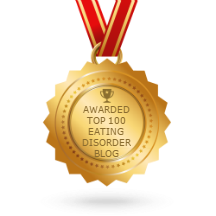- Home
- About
-
Services
- Therapy
-
Eating Disorder Trainings
>
- Clinical Approaches To Treating Body Image Issues
- Clinical Approaches To Treating Bulimia & Binge Eating Disorder
- Finding Freedom From Binge Eating
- Finding Freedom From Anorexia
- Supporting A Loved One With An Eating Disorder
- Eating Disorder Recovery Road Map
- Healing From Body Hate And Practicing Self-Compassion
- Common Questions
- Blog
- Press
- Contact
|
For many people the jump from ‘body hatred’ to ‘body love’ feels overwhelming and impossible. There’s a lot of talk in the media about focusing on ‘body love.’ For those who are struggling with loving their body, it may feel like they are failing. However, when I work with clients, I talk to them about redefining positive body image. The way that I define positive body image, is not spending so much time thinking about the appearance of your body because you are busy living your amazing life. Even if you look in the mirror and love what you see, the reality is that our bodies will change as we age. Our bodies are not slabs of marble and they are not meant to stay the same. Thus, putting your self worth into your external appearance is a recipe for discontent. However, one thing that can be helpful on the journey to creating a more positive body image (i.e. going from body-hate to a less body-focused life) is thinking about a sense of gratitude for body-function. Body Gratitude Practicing body-gratitude is all about shifting focus from the way that your body looks, to thinking about all of the incredible things that your body does for you everyday. It’s about learning to see that our bodies truly are meant to be our home, not a barometer of our worth or indicative of our value. There’s a great quote that I love from Glennon Doyle Melton which says, “Your body is not your masterpiece — your life is. It is suggested to us a million times a day that our BODIES are PROJECTS. They aren’t. Our lives are. Our spirituality is. Our relationships are. Our work is. Stop spending all day obsessing, cursing, perfecting your body like it’s all you’ve got to offer the world. Your body is not your art, it’s your paintbrush. Whether your paintbrush is a tall paintbrush or a thin paintbrush or a stocky paintbrush or a scratched up paintbrush is completely irrelevant. What is relevant is that YOU HAVE A PAINTBRUSH which can be used to transfer your insides onto the canvas of your life — where others can see it and be inspired and comforted by it.” Self-Compassion If you are struggling with a focus on the appearance of your body, it’s so important to be kind to yourself. You are definitely not alone in this and it’s not your fault. However, you can work to take steps to start to improve your body-image. Additionally, it’s important to note that when thinking about body-gratitude there are many people who struggle with chronic illness, health conditions, and physical disabilities. While, it may seem difficult to practice body gratitude. It’s helpful to acknowledge that it’s understandable that are struggling with this, and then work to shift focus for the abilities that you do have and for the things that your body does for you. If you are struggling with negative body image and it’s impacting your life, it’s so important to seek help from a professional. Seeking help when you are suffering is a sign of true strength, not weakness. After all, life is too short to spend your time hating your body and letting the way that you feel about your appearance, keep you from enjoying your incredible life. An Exercise: Here’s a quick exercise that you can do:
You can also check out the link below to listen to my free 13 minute, body-gratitude meditation. Jennifer Rollin, MSW, LCSW-C: is an eating disorder therapist in private practice in Rockville, Maryland. Jennifer specializes in helping teens and adults struggling with anorexia, binge eating disorder, and bulimia, and body image issues. Jennifer provides eating disorder therapy in Rockville, MD, easily accessible to individuals in Potomac, North Potomac, Bethesda, Olney, Germantown, and Washington D.C. Connect with Jennifer through her website: www.jenniferrollin.com
0 Comments
She has just finished dinner when the urges begin. It feels like the food in the pantry is calling to her. All she can think about is the package of Oreos, the peanut butter and bread, and the chips. She wants nothing more than to get lost in the cycle of eating. To numb out and to feel that initial pleasure, as she washes down a package of Oreos with gallon of milk. But part of her, doesn’t want to do this again. She wants nothing more than to be able to stop this terrible cycle. Yet, she doesn’t know how to cope with these intense urges. As an eating disorder therapist in private practice in Rockville, Maryland, I specialize in helping people to recover from eating disorders. The following are a few of my tips for what to do when you feel urges to binge eat. Steps to Take 1. Take a deep breath. 2. Remove yourself from the kitchen (if you are in the car drive home, i.e. remove yourself from the triggering environment if you can) and go somewhere where you can sit down. 3. Remind yourself that just because you have an urge, does not mean that you need to act on it. With practice, you can learn how to sit with and ride out the urges that you experience. Urges typically will naturally go down on their own, the more that we can sit with them. 4. Remind yourself of how you usually feel after a binge episode. Bingeing gives a temporary high or feeling of “comfort” or “calm” with long-term distress and unhappiness. Typically people feel physically and mentally terrible after a binge episode. 5. Be kind to yourself. Recognize that you are using bingeing either as a response to physical or emotional deprivation (i.e. you aren’t eating enough throughout the day, or you are eating things yet feeling guilty about them), and/or to cope with uncomfortable or unpleasant emotions. 6. Ask yourself, “Am I feeling physically hungry?” 7. If the answer is no, ask yourself, “What am I looking to feel (or to not feel) through turning to food?” One good option would be to write about this in a journal or notebook. 8. Identify two healthier coping strategies that you can try to get a similar feeling (i.e. if it’s a sense of comfort, call a friend or play with a pet). 9. Tell yourself that you will at least try these two healthier coping strategies before acting on the urge to binge. 10. If afterwards, you are still feeling the urge to binge-try reaching out to someone for support. 11. Remind yourself that you are not saying that you must give up bingeing forever. You can always go back to bingeing-however try to take it one day (even one meal) at a time. What if you tried something different this time? 12. Reach out for professional support. No one should have to struggle with an eating disorder or disordered eating alone. Getting help when you are struggling is a sign of true strength, not weakness. Eating disorders are treatable illnesses and full recovery is possible! The Bottom Line If you do end up bingeing after taking these steps, it’s so important to be compassionate with yourself. You are not alone in struggling with this and you are not simply “lacking willpower.” You are struggling with something, that no one would choose. It’s also so important that you don’t do anything to try to “compensate” for the binge, as this will only keep the binge/restrict cycle going. If you could ride out the urge even for a little bit, this shows that you were practicing an important skill and with time (and additional support) you can learn how to ride out the urge completely. If you could ride out the urge to binge completely, take a moment to recognize and acknowledge this. Ultimately, you deserve a meaningful and joyful life. No matter what you may be telling yourself, finding freedom from bingeing is possible. Yes, for you too. Jennifer Rollin, MSW, LCSW-C: is an eating disorder therapist in private practice in Rockville, Maryland. Jennifer specializes in helping teens and adults struggling with anorexia, binge eating disorder, and bulimia, and body image issues. Jennifer provides eating disorder therapy in Rockville, MD, easily accessible to individuals in Potomac, North Potomac, Bethesda, Olney, Germantown, and Washington D.C. Connect with Jennifer through her website: www.jenniferrollin.com |
About MeI'm an eating disorder therapist in private practice in Rockville, MD. Archives
June 2024
|



 RSS Feed
RSS Feed
